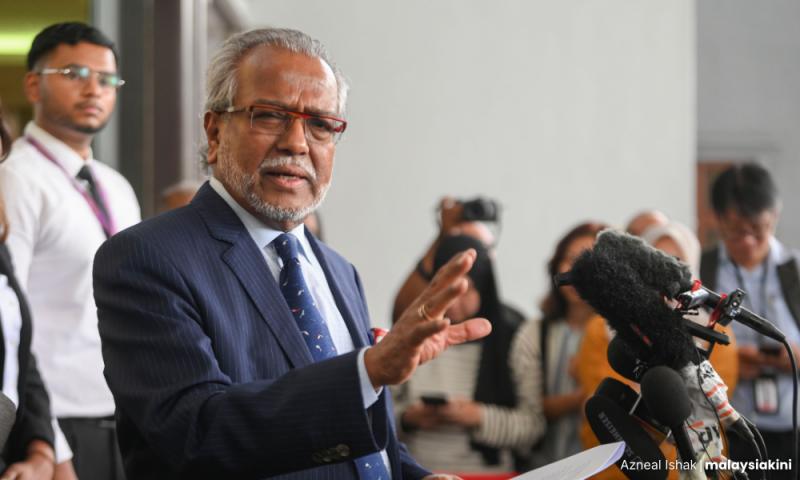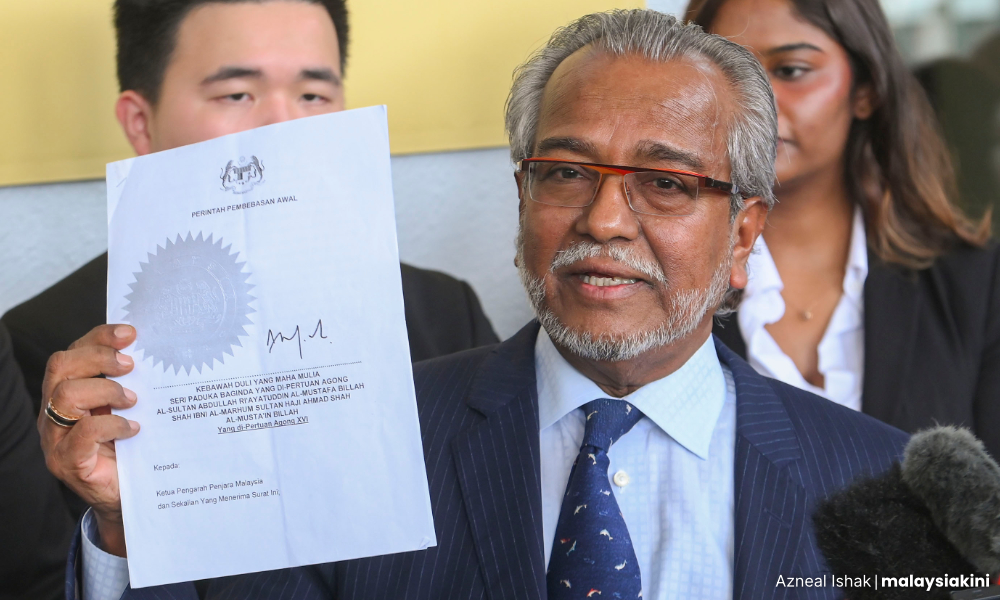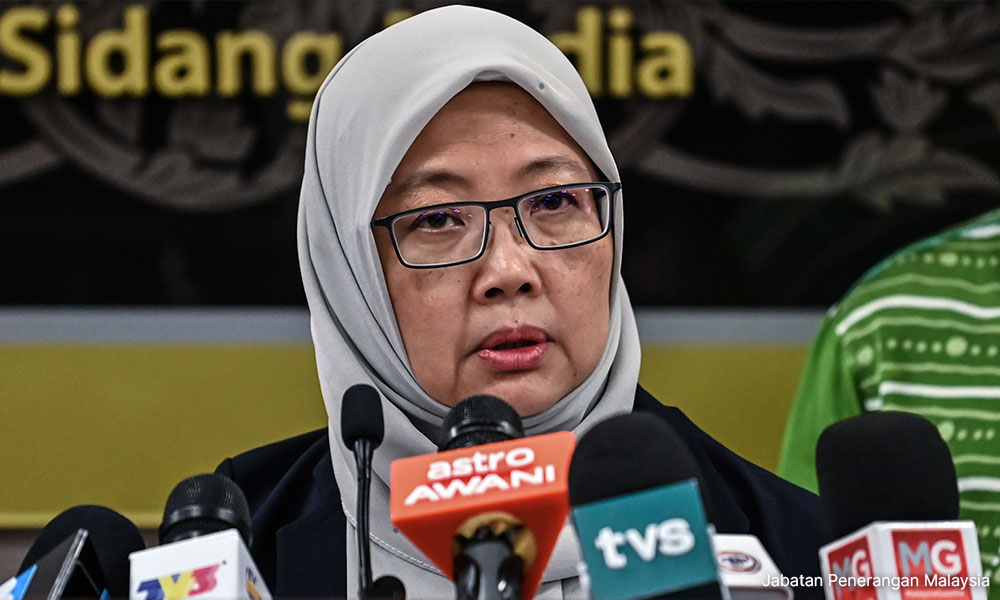
Pardons Board recommended Najib serve out his sentence - Shafee
A letter carrying the seal of the previous Yang di-Pertuan Agong shed light on a possible impasse between the then-king and the Pardons Board regarding Najib Abdul Razak’s jail sentence.
The letter, read out by Najib’s lawyer Muhammad Shafee Abdullah today, revealed that the Pardons Board did not advise the Agong to reduce the former prime minister’s prison term.
“The announcement (in the letter) is made by someone called Dr Zaliha Mustafa (the de facto Federal Territories Minister).
“After the preamble, they now say that ‘the Pardons Board, following Article 42 of the Federal Constitution had on Jan 29 considered the convict’s sentence and advised the Yang di-Pertuan Agong to serve out the rest of his sentence’.
“(The letter then says) ‘It is reasonable in His Majesty (the King’s) view, that mercy should be shown to Najib’,” Shafee said reading out the letter.
Shafee showed the letter to the media but did not hand out copies.

Sultan Abdullah Sultan Ahmad Shah
In the letter, Sultan Abdullah Sultan Ahmad Shah decreed, using his authority under Article 42 and other powers, that Najib’s sentence be halved and his fine be reduced to RM50 million.
Article 42 of the Federal Constitution covers the power to pardon and the formation of pardons boards at the federal and state levels.
Shafee noted that the letter was signed by Zaliha - who is a Federal Territories Pardons Board member - but also carries the royal seal.
He also said his client - Najib - received the letter as he was an affected party.
In the letter, Sultan Abdullah Sultan Ahmad Shah decreed, using his authority under Article 42 and other powers, that Najib’s sentence be halved and his fine be reduced to RM50 million.
Article 42 of the Federal Constitution covers the power to pardon and the formation of pardons boards at the federal and state levels.
Shafee noted that the letter was signed by Zaliha - who is a Federal Territories Pardons Board member - but also carries the royal seal.
He also said his client - Najib - received the letter as he was an affected party.

Lawyer Muhammad Shafee Abdullah
However, the lawyer cast doubts that the letter was written on Jan 29 when the Pardons Board met to decide on Najib.
He implied that it was written after the government’s Legal Affairs Division issued its statement announcing the Pardons Board decision on Feb 2.
He said this is because the letter does not contain errors and ‘blunders’ as in the Feb 2 statement - such as stating that Najib would get a 50 percent discount on his RM210 million fine, which was incorrect.
Agong held a vote
Earlier in his press conference, Shafee also insinuated that Sultan Abdullah wanted to grant Najib a full pardon.
“I am told, and I am confident this happened otherwise I wouldn’t dare tell you this, that on Jan 29, the Yang di-Pertuan Agong was thinking of a full pardon.
“But he wanted to be sure,” Shafee claimed.
He then alleged that the ruler passed empty ballots to the “four” non-permanent members of the Pardons Board on whether a full pardon should be granted.
The Federal Territories Pardons Board should only have three non-permanent members, with another three being the Agong, the attorney-general, and the Federal Territories minister.
Shafee said he does not know what the results of the vote were, but that it led to Najib’s sentence being reduced instead of a full pardon.
However, the lawyer cast doubts that the letter was written on Jan 29 when the Pardons Board met to decide on Najib.
He implied that it was written after the government’s Legal Affairs Division issued its statement announcing the Pardons Board decision on Feb 2.
He said this is because the letter does not contain errors and ‘blunders’ as in the Feb 2 statement - such as stating that Najib would get a 50 percent discount on his RM210 million fine, which was incorrect.
Agong held a vote
Earlier in his press conference, Shafee also insinuated that Sultan Abdullah wanted to grant Najib a full pardon.
“I am told, and I am confident this happened otherwise I wouldn’t dare tell you this, that on Jan 29, the Yang di-Pertuan Agong was thinking of a full pardon.
“But he wanted to be sure,” Shafee claimed.
He then alleged that the ruler passed empty ballots to the “four” non-permanent members of the Pardons Board on whether a full pardon should be granted.
The Federal Territories Pardons Board should only have three non-permanent members, with another three being the Agong, the attorney-general, and the Federal Territories minister.
Shafee said he does not know what the results of the vote were, but that it led to Najib’s sentence being reduced instead of a full pardon.

Minister in the Prime Minister’s Department (Federal Territories) Dr Zaliha Mustafa
He claimed this showed that contrary to claims otherwise, the Yang di-Pertuan Agong had the prerogative to decide on pardons but that Sultan Abdullah chose to listen to the advice of others.
The government’s position has been that the power to pardon, and thus the Pardons Board’s decisions, are the sole prerogative of the Agong.
Zaliha said on Saturday that the reduction of Najib’s sentence was a “collective decision”.
The Malaysian Bar and other legal experts, meanwhile, maintain that the Agong must follow the advice of the executive, as per Article 40(1) of the Federal Constitution.
Later in the press conference, Shafee claimed this was based on what was being discussed in the public.
Shafee had said that Najib is considering filing for another pardon to secure his freedom.
The decision to reduce Najib’s sentence caused widespread dismay, with critics lamenting the former prime minister should not have been shown leniency, while Najib and his supporters yearned for a full pardon.
He claimed this showed that contrary to claims otherwise, the Yang di-Pertuan Agong had the prerogative to decide on pardons but that Sultan Abdullah chose to listen to the advice of others.
The government’s position has been that the power to pardon, and thus the Pardons Board’s decisions, are the sole prerogative of the Agong.
Zaliha said on Saturday that the reduction of Najib’s sentence was a “collective decision”.
The Malaysian Bar and other legal experts, meanwhile, maintain that the Agong must follow the advice of the executive, as per Article 40(1) of the Federal Constitution.
Later in the press conference, Shafee claimed this was based on what was being discussed in the public.
Shafee had said that Najib is considering filing for another pardon to secure his freedom.
The decision to reduce Najib’s sentence caused widespread dismay, with critics lamenting the former prime minister should not have been shown leniency, while Najib and his supporters yearned for a full pardon.
No comments:
Post a Comment